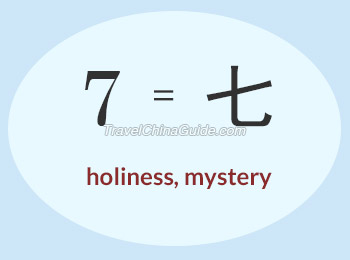Lucky Number 7
General Analysis
 People with the lucky number 7 usually like to explore the causes of the matters. However, when finding the truth, they are too afraid to accept it. Thus they often try to cover up their fear and weakness. In spite of this, they have an excellent analysis capability, which helps them succeed in any job. Besides, people with the lucky number 7 are doomed to be fortunate and get good opportunities which others try hard to seek. So to some extent, their success ought to be attributed to their good luck. What a pity that they are sometimes lazy and idle because of their frequent and easy chances. Anyway, generally speaking, they are smart and knowledgeable, but a little suspicious of, and indifferent to, other people.
People with the lucky number 7 usually like to explore the causes of the matters. However, when finding the truth, they are too afraid to accept it. Thus they often try to cover up their fear and weakness. In spite of this, they have an excellent analysis capability, which helps them succeed in any job. Besides, people with the lucky number 7 are doomed to be fortunate and get good opportunities which others try hard to seek. So to some extent, their success ought to be attributed to their good luck. What a pity that they are sometimes lazy and idle because of their frequent and easy chances. Anyway, generally speaking, they are smart and knowledgeable, but a little suspicious of, and indifferent to, other people.Romantic Relationship
No. 7 in Chinese Culture
7 was widely used in ancient Chinese culture, for example the Seven Treasures for Buddhist Scripture refer to gold, silver, colored glaze, coral, amber, seashell, and agate. Another example is the Double Seventh Festival when the Milky Way Lovers (the Cowherd and the Weaving Maid) can have their annual meeting only on July 7th. As a Chinese legend goes, when the Jade Emperor in Heaven learnt that his beloved daughter, Weaving Maid, had married a poor cowherd and lived a happy life, he created the Milky Way to separate the lovers. After that, only on the seventh day of the seven month each year, the Cowherd and the Weaving Maid got a chance to meet on the Magpies Bridge which was formed over the Milky Way by a large number of magpies. Therefore, July 7th is regarded as the Chinese Valentine’s Day.
"To create a poem within seven steps” is used to describe somebody’s quickness in wit and dexterity in literary creativity. The old saying dates back to a scholar and poet named Cao Zhi, son of Cao Cao, King of the Wei, during the Three Kingdoms Period (220-280). In order to avoid being killed by his brother, Cao Zhi created a poem within the time required for taking seven steps.
"Seven Arrests and Seven Releases” means making an opponent give in by using some tricks. It is also based on a story that happened in the Three Kingdoms Period. Zhuge Liang, an excellent strategist and military counselor in the Shu Kingdom, artfully arrested a southern tribe chief seven times and released him as often, to get the chief to eventually give in.
Although Seven is generally considered a propitious number, it is at times disliked in China. The July 7th Incident of 1937 (also named Marco Polo Bridge Incident) always reminds Chinese people of the painful history of the eight-year’s Sino-Japanese War. 7 has the same pronunciation with 欺, Qi in Chinese, meaning cheating, lying to, or riding roughshod over someone. When choosing a telephone number or something like that, 7 is often left out of the list. The Seven Year Itch, the famous American movie, has long been a popular saying in China to describe the unsteady period of a marriage. It means that in the seventh year of a marriage, the couple faces serious problems in their relationship. Once a bit of negligence or unwise action is taken, their marriage may end up in the same year.
- Last updated on Oct. 07, 2023 -